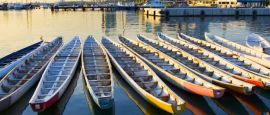Philippines Shopping and nightlife
Shopping in Philippines
The Philippines has inherited from the US a passion for shopping centres, and every urban area of any size has at least one of these air-conditioned havens. There are also, however, plenty of more traditional covered and open-air markets.
It’s usually cheaper to buy handicrafts in their place of origin, but Manila offers opportunities to get them all in one place. The Tiendesitas shopping centre has 12 pavilions, each with a different selection of goods (from antiques to fashion and furniture), while Divisoria flea market offers a more chaotic shopping experience. Outside of the capital, Baguio is noted for its silver and handicraft stores, while Cebu City’s Carbon market rivals Divisoria.
Typical souvenirs include the barong tagalog (hand-embroidered dress shirts made from pineapple fibres), brassware from the south, guitars from Cebu, painted papier-mâché horses from Laguna, rattan furniture, woven grass mats (banig), antique wooden figurines of saints, carved rice guardian figures from the Cordillera mountains, pearls from Mindanao or Palawan, terracotta pots and abaca (Manila hemp) placemats.
Nightlife in Philippines
Throughout Asia you’ll find Filipino cover bands playing in hotels and bars, and this affinity for music is reflected in Manila’s lively nightlife – as well as in the universal popularity of karaoke (known here as ‘videoke’).
A night out could involve anything from the VIP area of an upmarket superclub to a table in a grungy bar with a band playing Pinoy (Filipino) rock or folk music. Manila’s transvestite revues (some of them very glamorous) are also popular with tourists, while the Cultural Center of the Philippines provides more highbrow entertainment such as ballet, opera and classical music.
Outside of Manila, nightlife options are much more restricted. In many towns the best you can hope for (outside of the annual fiesta) is a cover band in a bar, playing folk, country or reggae tunes. Exceptions tend to be university towns, such as Baguio, which has many places to sample live music. As the second city, Cebu also has a vibrant club scene.




 You know where
You know where